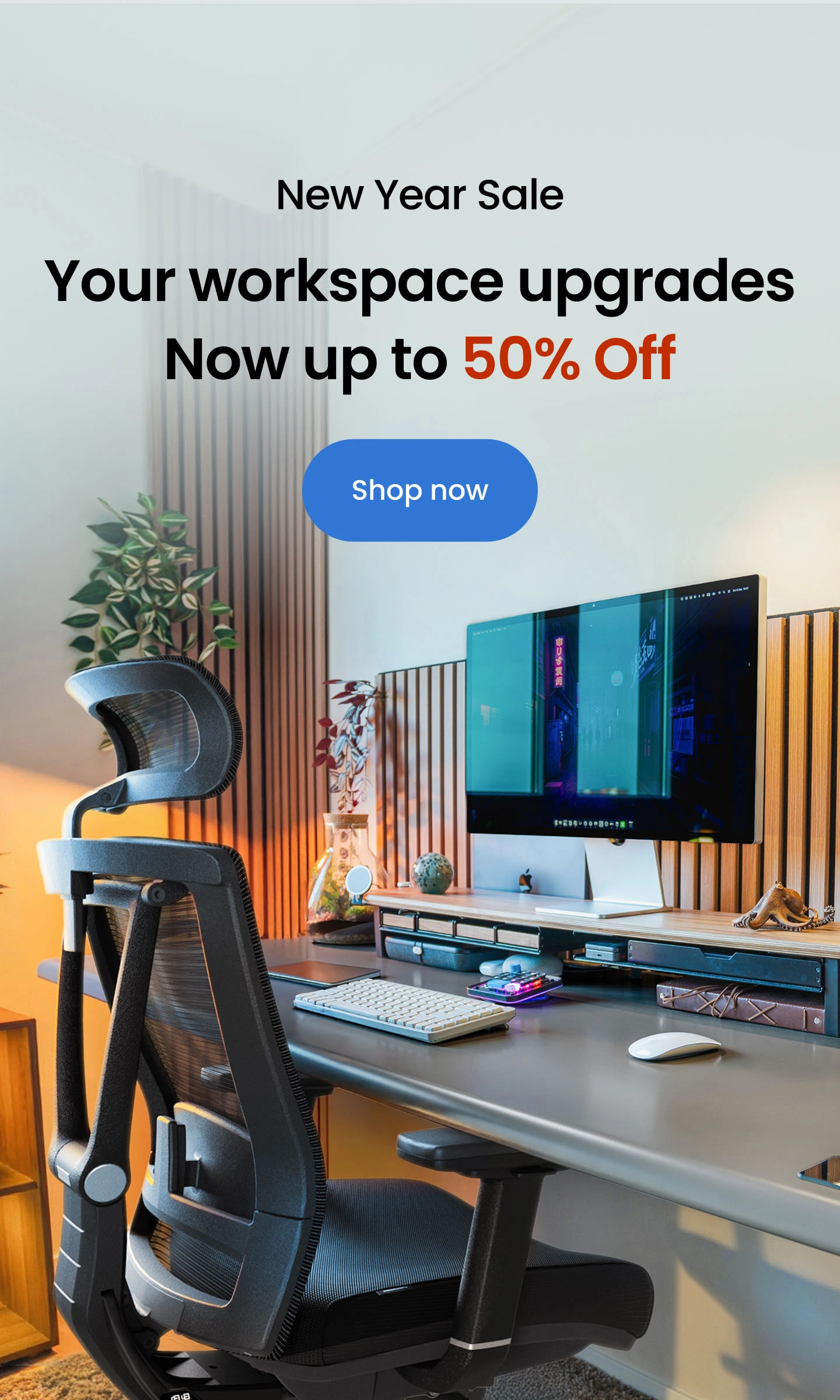
10 Tips to Protect Health If You Stand All Day at Work
According to the US Bureau of Labor Statistics, 56.8 percent of civilian workers spend the average day standing. It is a natural posture that only becomes a health risk when done for long periods.
Many people in this working category often complain about swollen feet, varicose veins, lower back pain, stiffness in the neck, and many other health issues. Studies have shown that most of these problems occur because people work on their feet for close to eight hours daily.
There are many ways to help you reduce this risk if you are part of this group. This article will share 10 tips for standing all day at work.
Health Risks Associated with Standing at Work All Day
Your body uses the leg, back, and neck muscles when standing. Being upright, however, slows down how much blood gets to these loaded points. This situation results in the development of pain and fatigue in these muscular regions.
The strain on your body may not be the only discomfort you feel from standing 8 hours a day. Blood gathering in your legs and feet can also inflame your veins. This condition can worsen to become varicose veins if you don’t change your work culture.
Being upright for a long time puts pressure on your skeletal frame. Most of this focuses on the joints, damaging your tendons and ligaments in the end.
Tips to Help You Get Used to Standing All Day at Work
If you stand for extended periods at work, you can use the methods below to reduce the associated health problems and learn how to get used to standing all day.
1. Wear the Proper Footwear

Your footwear influences your posture when standing. If you are going to be on your feet for close to eight hours, you should wear something comfortable.
Consider wearing shoes that fit well. Footwear that changes the shape of your feet will affect your posture.
Apart from a well-fitting shoe, also consider how much elevation it provides. This feature has a direct influence on your arch. When it is too high or too flat, it emphasizes the curve in your back. Maintaining this for the working day causes pain.
The heels of your footwear also affect your lower back and hamstring. Damaging these parts of your body leads to common health problems like scoliosis, sciatica, and osteoarthritis.
Shoes that are comfortable and curve to fit your feet are the best types to wear.
2. Take Breaks and Move About

One trick to preventing the health issues mentioned earlier is to shorten how long you work continuously. You don’t want to be propped up in the same spot all day.
When you have been at a task that makes you immobile for close to an hour, simply changing your position promotes circulation.
You can take it up a notch by moving from side to side while you work. Shuffling redistributes your body weight and the strain on your skeleton.
Sometimes, you get used to standing all day at work. You must make a conscious effort to move around your workspace during such moments.
Use natural activities such as bathroom or coffee breaks intermittently. Walking around with purpose also prevents your boss or supervisor from thinking that you are slacking off.
This tip doesn’t just help your body but also keeps your mind fresh and sharp.
3. Build Your Strength
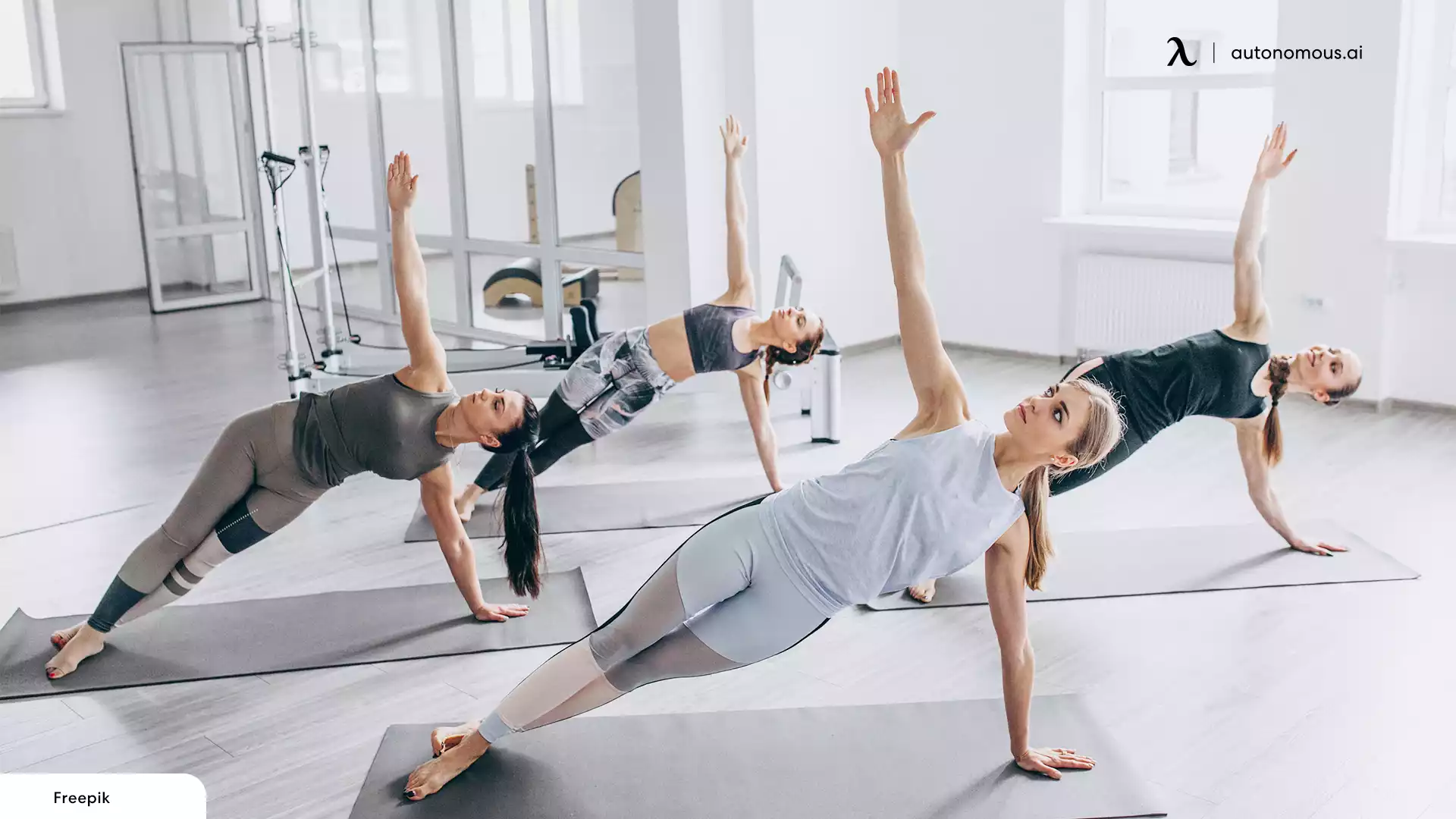
You should prepare your body well with exercises if you know you will be working on your feet all day.
Spare a few minutes every day to undertake a fitness routine to strengthen your bones and muscles. Limit it to two or three times a week if doing it every day is not realistic according to your schedule.
Doing simple push-ups, pull-ups, glute bridges, and squats help to increase your strength and resistance. Weight lifting is also a great way to develop your body’s ability to handle the task of standing eight hours a day.
The trick is not to make these workouts very intensive but to try and be consistent in their execution. It will take a while for your physical structure to transform enough to make standing easier.
Give yourself the best of both worlds. Use your strength and resistance training to maintain a good body while reducing the health risk from your job.
4. Get a Foot Roller
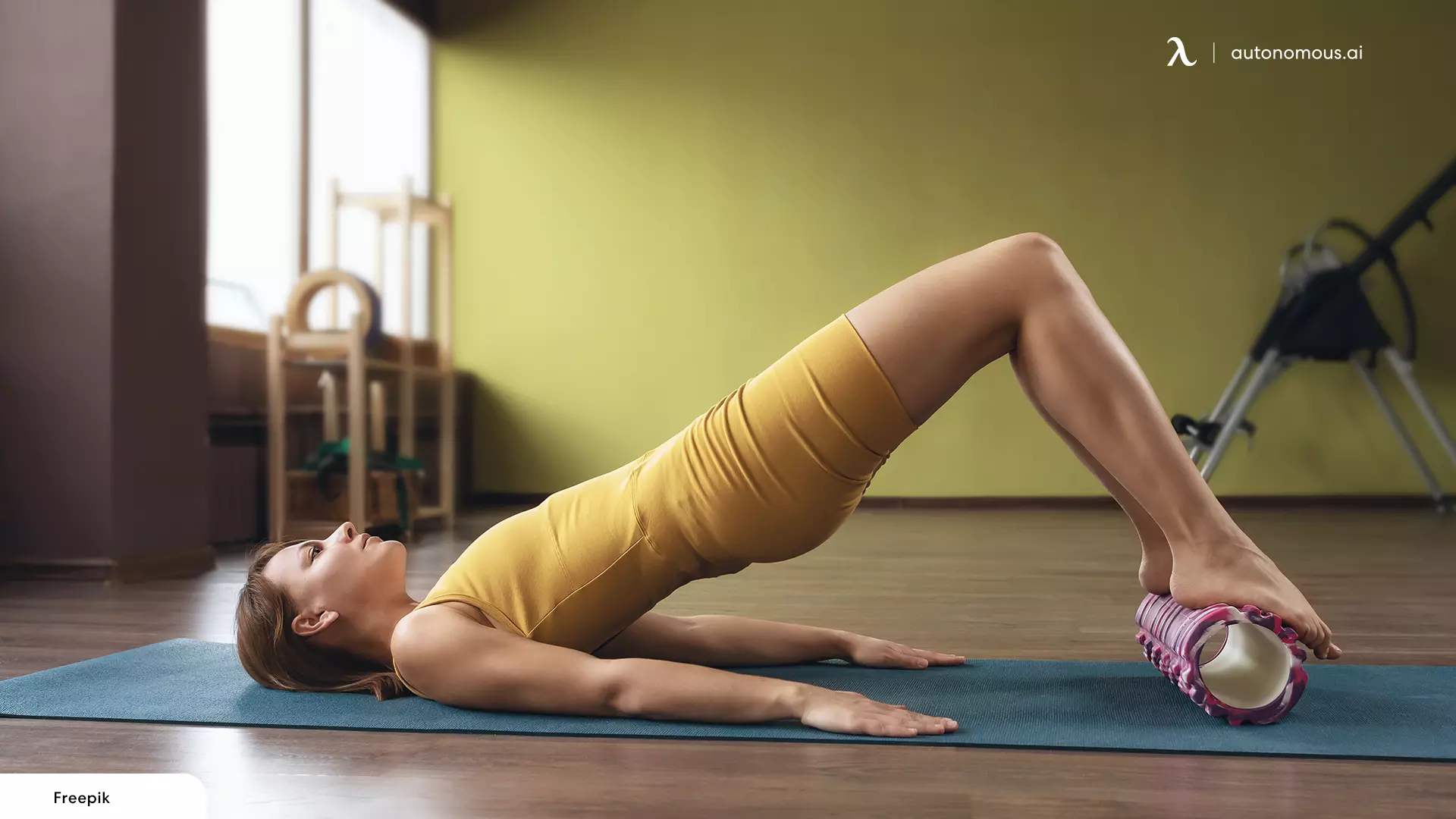
Focus on strengthening your feet more when training your body to handle the stress from standing. You can easily do this using a foot roller while you work out.
This item is a piece of cheap portable exercising equipment you can use to improve mobility in your feet. It also works as a foot massage to relax the muscles there. The device is so elementary that you can even take it to work and use it on breaks.
Pain in the foot is a result of tightness in your arches. Sometimes it is also because of Achilles tendonitis.
Using a foot roller two to three times daily for less than a minute each time is helpful. It strengthens your feet muscles and increases blood circulation.
Getting this device is a simple way to prevent health problems developed from standing all day.
5. Check Your Posture When Working
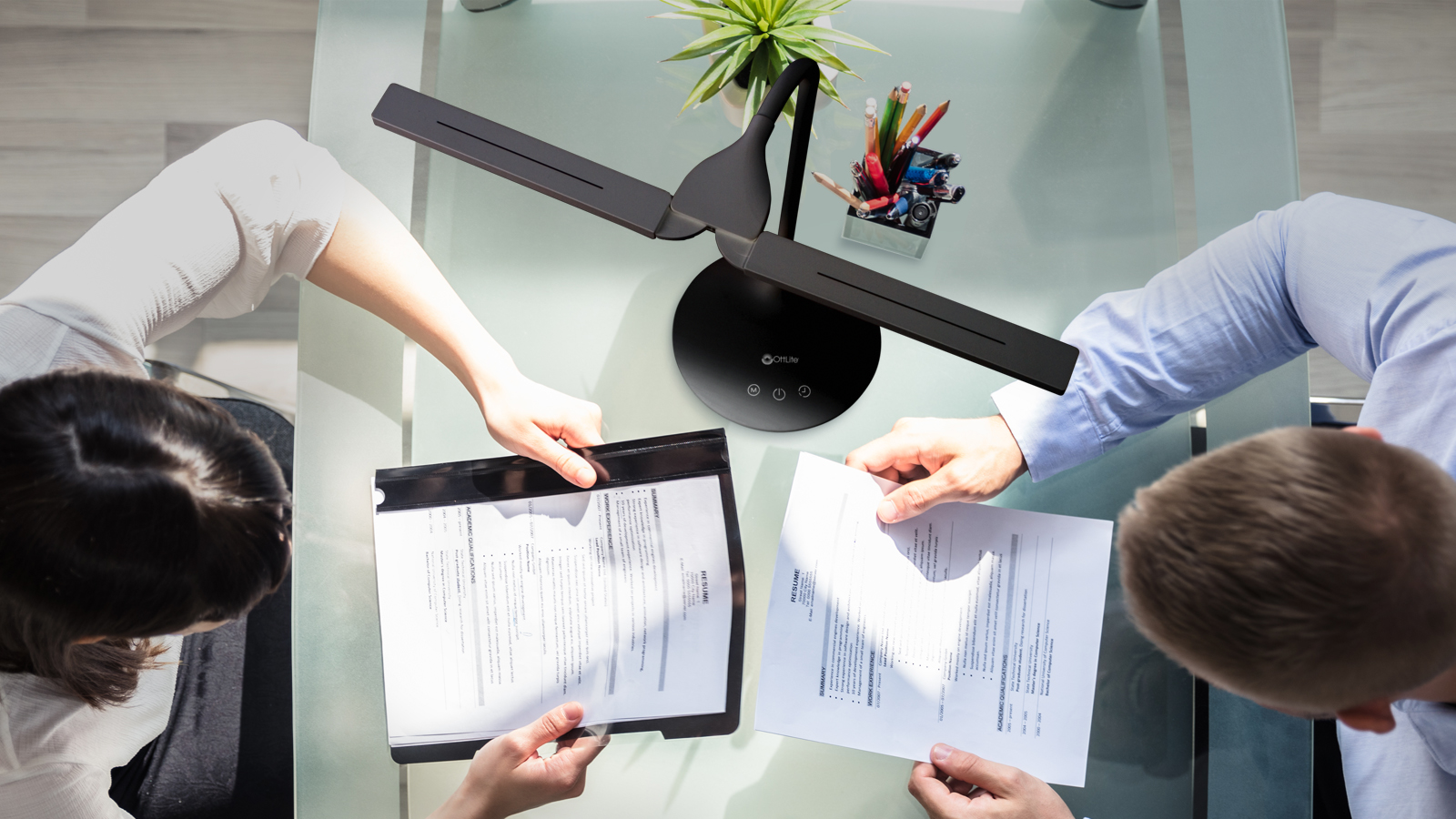
Standing alone may not be responsible for the body pains you develop from your job. Do your best to check your posture occasionally when carrying out your daily activities. A bad posture is as much to blame for the health issues attributed to being on your feet.
It is great to know whether you have a bad posture or not as you work. This knowledge will motivate you to take the necessary steps to correct a poor stance before it harms you.
Maintaining a bad posture for years makes the proper one feel uncomfortable. Intentionally stand with a correct pose for some time, so you can eventually get used to it.
In the correct standing position, your head should not be leaning forward. You should also ensure that the central parts of your shoulders are in line with your ears.
Straighten your upper and lower back as much as you can. Do this knowing that it is normal to have slight curves in your shoulders and lower back.
Next, you should align your hips with your shoulders and knees. You can stare down at your knees to check whether they line up with your ankles.
Assessing your posture is not easy, and maintaining the right one is even more difficult. It will take a while to master how to work in the correct standing position.
6. Stretch Regularly

Stretching is an excellent way to relax your muscles and correct your posture. The best part of it is that it is easy to execute anywhere you find yourself. You can therefore stretch at home and also at work during breaks.
Shrugs are great for improving your neck muscles, shoulders, and upper back. Incorporating it into your workout should help you eliminate any chronic pain you may be experiencing in your trapezius muscle.
You can stretch your chest to help loosen your shoulder muscles and biceps. It is a great way to improve your flexibility and posture. Opening up and closing your chest muscles also help to improve your blood circulation.
The waist twist is a way to strengthen your core. This stretch tightens muscles in your midsection and helps prevent back injury. It is also critical for individuals who want to achieve physical strength and balance.
Lower back stretches build your muscles at that location, increase flexibility, and eliminate pain.
7. Invert Your Body after Work
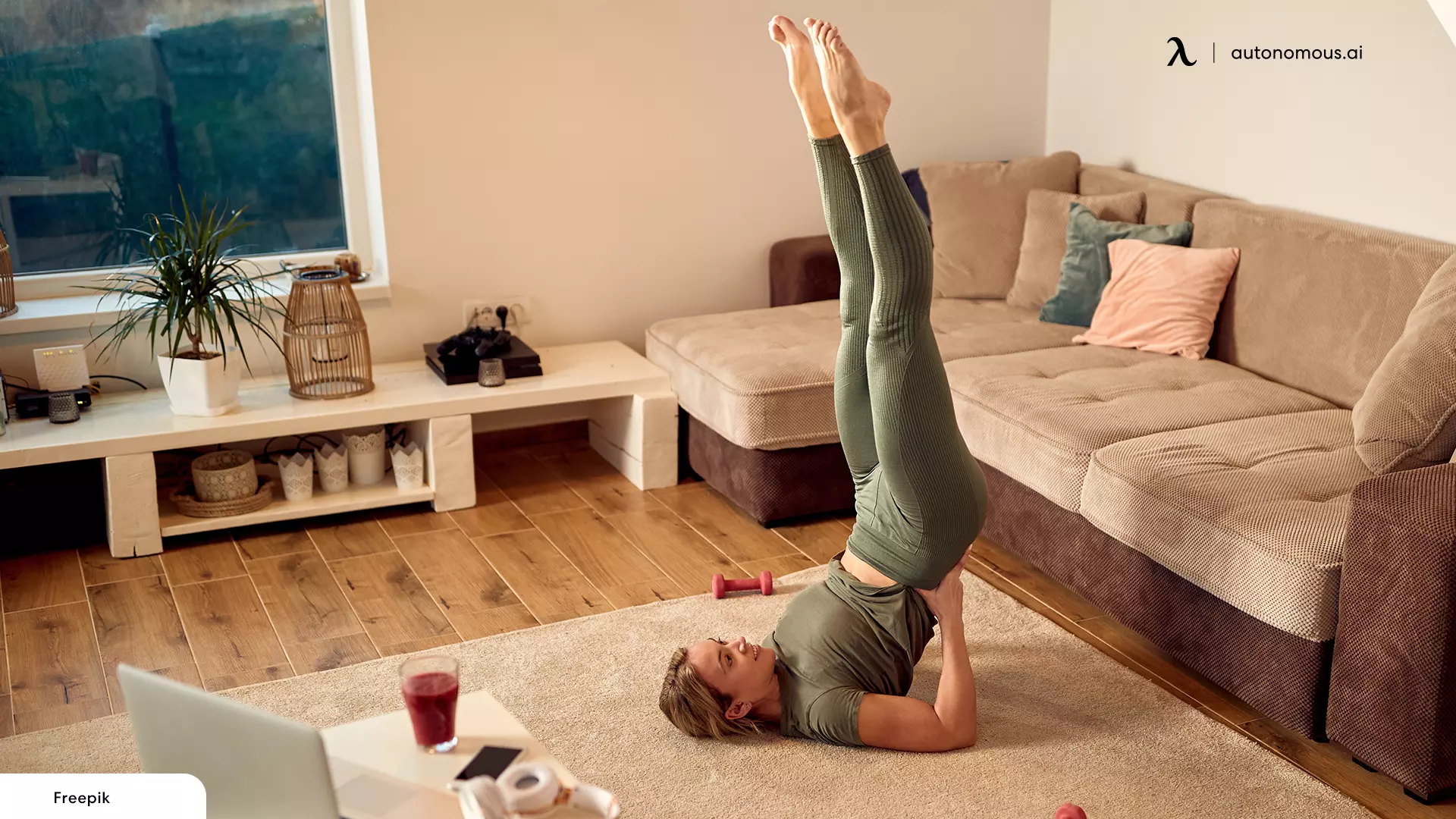
After standing all day at work, you might consider the idea of counteracting some of the pressure gravity exerted on your lower parts.
A simple way is to lie down with your legs up at an angle of 90 degrees against the wall. Doing this for a few minutes every day is a great inversion exercise.
Another way involves performing a self-supported inversion if you can. This pose collectively describes handstands, headstands, or elbow stands.
There are equipment and tools, such as inversion tables, to help you pose upside down if necessary. The plan is to reverse the effects of staying on your feet throughout the day.
8. Create an Ergonomic Workspace
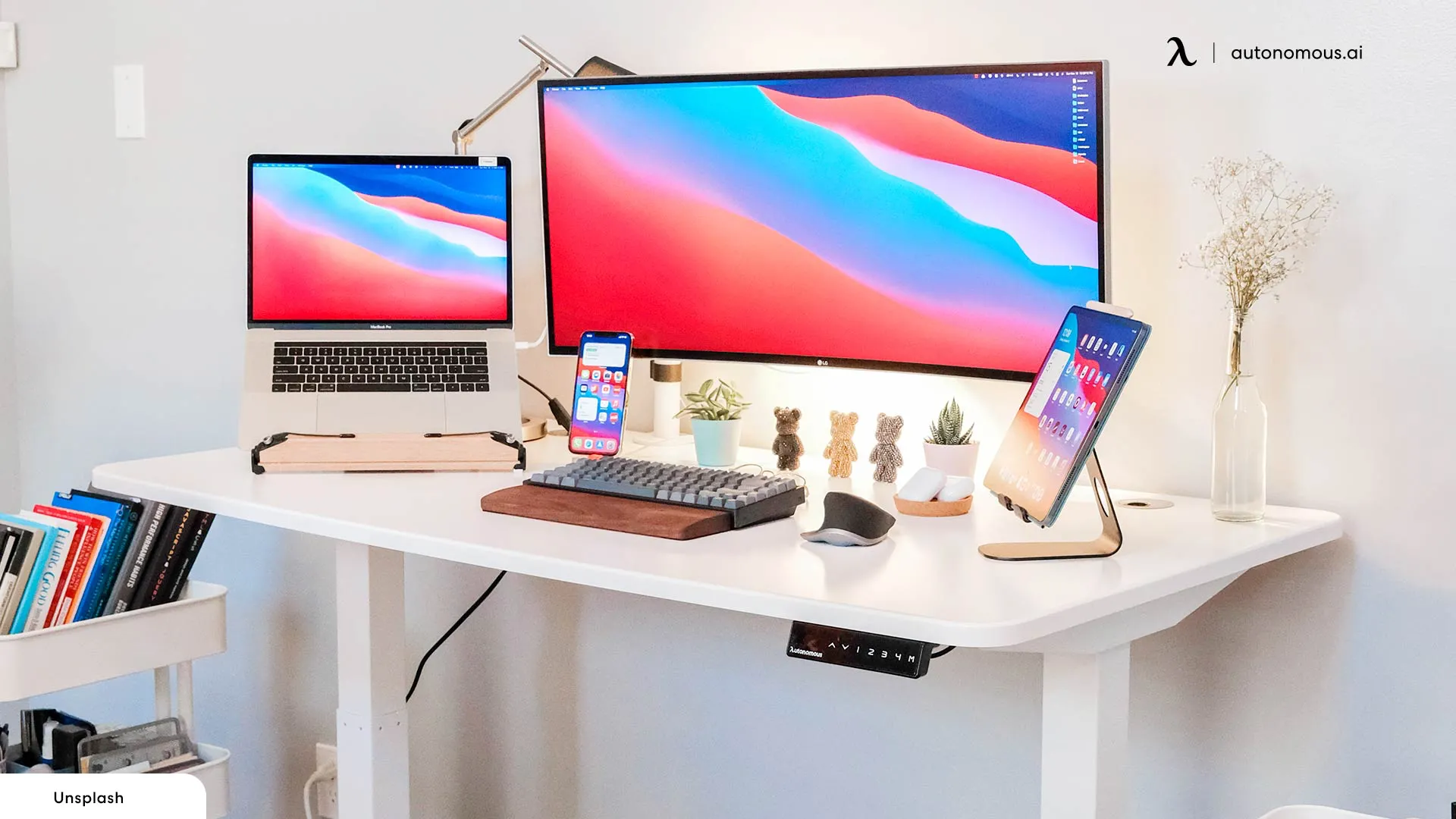
Reduce the pressure and strain you experience from standing all day with a more efficient workspace. You do this by limiting the way you execute some tasks. Use an ergonomic working area to minimize lifting, bending, leaning, and reaching.
To reduce how often you reach for things, keep items you regularly use less than 15 centimeters away from your standing position. This rule increases efficiency and makes you more comfortable when working.
Try to refrain from twisting your torso on the job. Consciously turn your whole body if you need to get an item from any direction. You should turn your body with your legs, not your waist or anything above.
Get a standing desk if you find yourself working on your feet all day. The standing desk height is elevated enough to get your computer and other files comfortably within reach. Typically, these products feature drawers for office supply storage.
Is standing better than sitting? Research indicates there are health benefits of standing. Therefore, you may want desks that help you manage your work environment more thoroughly. This reduces the probability of performing an action that will lead to health problems.
9. Don’t Stand on Hard Surfaces
How hard a floor is influences the amount of pressure exerted on your spine when you walk or stand on it. That is why standing on metal or concrete for a long time at work is one major cause of back pain.
If you are working on your feet all day, it is best to do it on surfaces made from rubber, cork, or wood. These materials absorb the shock produced from your movement instead of your body. It is a great way to reduce stress on your bones and joints.
Use an anti-fatigue mat if you can’t control the surface you stand on. The best standing desk mat is made from soft materials that offer the shock absorption that the recommended floor surfaces provide. They disperse your weight well on the floor, making them effective even if you are stationary.
The principle applied here is the same as the one that suggests you wear appropriate footwear on the job.
10. Visit the Chiropractor Regularly
Consulting an expert is always a good move, especially if it concerns your health.
Chiropractors are the professionals to go and see on the subject of muscles, nerves, and the skeletal system. Getting expert advice goes a long way in treating all the components of your body that get affected after standing for long hours.
You can receive treatment for your neck or back pain by taking a trip to these medical practitioners. They can also help you correct the shape of your spine if it is misaligned.
Most of the health problems that develop from bad posture and long-standing hours fall within their expertise.
Find one and book an appointment to get details on the issues mentioned in this article.
Autonomous EPP
Autonomous sells items that help you prepare for standing all day. It offers the best office equipment and accessories available on the market.
You can access its discounts if you can prove you are a worker. Companies that make bulk purchases can also enjoy these benefits.
The Autonomous employee purchase program requires that you register with your company’s credentials first. You can then take advantage of the various opportunities on offer.
Conclusion
The lifestyle tips shared should help you learn how to prepare for standing all day without the associated health problems. You have to note that these don’t work immediately. They are only effective when you practice them consistently.
It takes some time for your body to adjust to physical transformation. The increased strength and endurance help with stress management. Resting well will also heal whatever strain or injury you still develop in the end.
Change your job practices and reduce the effects of standing all day at work. And, don’t forget Autonomous EPP!
.svg)



